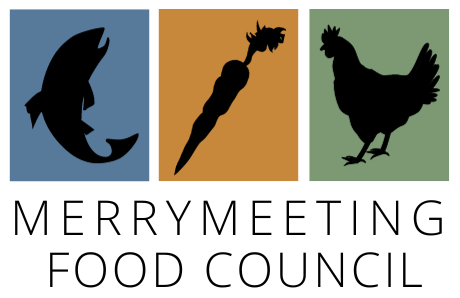Celebrating 100,000 lbs and the community built with Merrymeeting Gleaners volunteers, representatives of recipient sites and farmers. Volunteers organized a CSA share donation to thank Gleaning Coordinator, Kelly Davis, for all of her tremendous work.
Projects:
Know Your Veggies: The gleaners wrapped up a project with SNAP-ED to develop a booklet called "Know Your Veggies". This booklet is a tool to help people receiving the gleaned produce to know how to identify it, store it, cook it, etc. The booklet has been distributed to the organizations that receive the produce. It is also available for free to download here.
Sharing Tables: There are now SIX sharing tables set up on a weekly basis (Arrowsic, Bath, Brunswick, Bowdoin, Harpswell, Topsham). We have a team of Sharing Table volunteers that are take care of the set up and break down each week. We are using a check mark system at each of the tables to track the number of users while still keeping it anonymous.
Gleaning: In July, the gleaners passed 100,000 pounds of produce donated since 2016. On September 15th, volunteers from the Merrymeeting Gleaners, representatives of organizations receiving gleaned produce, and farmers joined to celebrate reaching 100,000 lbs and the community being built through this project. We are gleaning 5 days a week at 3 farms and 3 farmers markets. 100,000 lbs! news coverage. Like many of our partners, we worked to support asylum seekers who arrived in Maine earlier this summer.
As a short term approach to assist with farm labor challenges, the gleaners are officially offering to visit farms and help with specific tasks in exchange for a food donation. Farms can complete this request form which is also linked on the MFC website.
Anne McKee, our Bowdoin Summer Fellow worked as a Team Leader at Scatter Good Farm, worked at the LOCAL Garden and conducted 1:1 interviews with our recipient organizations. Key takeaways from the interviews were that overall they feel the partnership is working very well and there is a lot of excitement about the Know Your Veggies booklet. The one common issue cited was the need for produce bags at the sites. Solutions are being considered. See a video Anne created about her experience here.
Processing: Merrymeeting Gleaners and Turtle Rock Farm continue to work on additional processing efforts to preserve the summer bounty and extend the availability of local produce through the winter.
Connections/Outreach:
New connections built in Arrowsic, with the Village Clubhouse in Topsham, and with Opportunity Enterprises in Bath.
We have had several pop-up gleans this summer at farms we have not worked with in the past. This is a great way for farms to test if gleaning is a good fit for them.
Action Items:
Organizations interested in receiving gleaned produce and farms interested in donating produce can contact Kelly.
Volunteers interested in gleaning or distributing food can contact Kelly and she will send you the links to sign up. Please spread this info to any potential volunteers!
Follow us on Facebook and Instagram for the latest Merrymeeting Gleaners news!
Contact is Kelly Davis; merrymeetinggleaners@gmail.com.



